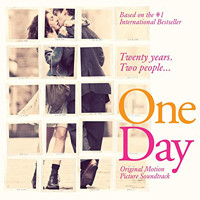Rachel Portman doesn’t get the credit she deserves – and I mean from me. I was (for reasons unknown even to myself) looking back on my reviews of her music – the few I have written, anyway – and particularly the older ones I was continually just saying it was all pleasant and interchangeable. Indeed, one might say that my reviews were somewhat unpleasant and interchangeable. I know the 1990s, when she was really making a name for herself, were (particularly compared with today) a time of plenty for lovers of film music, so perhaps it was forgivable to fail to spot just what she was doing because there were magnificent film scores being released all the time.
For one thing, she was ploughing a path for female composers – still depressingly thin on the ground even today, but back then absurdly uncommon. Yes there were others – Shirley Walker most prominently, then Debbie Wiseman emerged a little later – but not scoring big box office, Oscar-bait movies like Portman. Indeed, she even won an Oscar (for her effervescent, charming score for Emma) – not that you would have known it when Hildur Guðnadóttir won one for Joker and was almost universally lauded as the first female composer to do so.
In truth, yes, her body of work is dominated by scores for romances – chick flicks, as you’re probably not allowed to say any more. And musically they do tend to have a lot in common. But – and this cannot be said loudly enough – she could (and can) write absolutely belting main themes. They stick around in the memory – they tend to be happy, positive, joyful – yes, they can get repeated a lot over the course of the albums, but today I find it hard to see that as a particularly negative thing, particularly since most of the albums are in the 30-40 minute range.
One Day encapsulates all that is so good about her music for these films. While she stopped getting as much attention for them after the turn of the century, Portman kept on blessing us with these almost inconceivably charming scores thereafter. She takes a simple four-note motif here and turns it into this great comfort blanket of a main theme, wrapping it generously around us and leaving us to swoon in wonder. It’s so outwardly emotional, so charmingly lovely – is this really 21st century film music?
We get variation upon variation of it – a waltz version for chamber orchestra, a mournful choral version – and indeed plenty more for the strings, as in the main title. There are some set pieces that jut in and do there own thing – not many, but enough that you don’t just feel like you’re listening to an endless set of variations on the same thing.
Anyone tempted to suggest that scoring this sort of film is easy should listen to a few scores for this sort of film that are not by Rachel Portman. You’ll find some good ones, of course – but not many that carry such a distinctive style, such an abundance of charm and above all, such wonderful melodic warmth. Portman is a trailblazer for sure, and she’s also a truly wonderful composer. If I’ve underappreciated her in the past, then I’ll do my best to make up for it from now on. One Day is – like so many of her others – absolutely spot-on, sublimely beautiful and endlessly radiant. Nobody has ever done this better.












Also worth mentioning that Anne Dudley also won an Oscar for “Best Music, Original Musical or Comedy Score” for “The Full Monty” (1997).
Together with Rachel Portman that’s now 2 at least, both in the 90’s.
So why no one remembered that either when Ms. Guðnadóttir was so hyped as the “first female composer to receive the score oscar” is a bit puzzling to say the least.
Yes, absolutely.